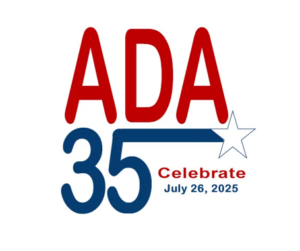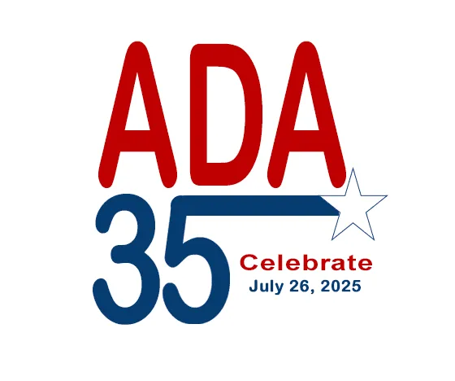
July 26, 2025 marks the 35th anniversary of the passing of the Americans with Disabilities Act. For many in the disability community this anniversary is marked both with a desire to celebrate what progress has been made in securing our basic rights, but also with lamentation and frustration at how far we still must go. While (for now) public laws and codes require most public spaces to theoretically meet a bare minimum standard of accessibility (which is generally nowhere near sufficient to earn that label), the collective consciousness of the nation still seems to default to ableism.
I want to believe that the ablism as the default mentality is done out of ignorance instead of malice, but I know it is often a mixed bag. There are people who insist that it is their God-given right to mock the disabled, cruelly insisting on making us the brunt of their jokes or calling us “snowflakes” if we ask them to not use the R-word. Even the current President mocked a reporter’s disability at one of his rallies and his fan-base had no problem with it. So, I see the malice and the cruelty that fuels ablism, but I also see the ignorance.
When I was a kid in grade school the trend on the playground was to tell stump and Helen Keller jokes – making those with limb differences, deafness, and blindness their punchlines. People did this in front of me – a person with a limb difference. I thought we were beyond such ignorance as a culture, but in recent years I’ve been hearing stump jokes resurface – often told to my face cluelessly by people who are utterly ignorant that they are using my very existence to elicit a laugh.
Groups of friends plan events in upstairs locations and never wonder why I can’t attend. At parties I am left sitting alone while groups stand in a circle chatting a few feet away, clueless that I physically cannot do the same. I attempt to join meet-up groups only to discover that they too meet in inaccessible upstairs rooms, or at places with no parking (assuming anyone can park blocks away on the street), or at standing only venues, or at outdoor venues with loose gravel yards that my mobility devices can’t manage. These locations are never chosen with a deliberate purpose to exclude the disabled, it just never ever occurs to them to think about accessibility needs.
Or since developing mobility disabilities I’ve had to pay closer attention to accessible parking spaces. More often than I ever would have imagined I see handicapped spots full of cars without the necessary tags or plates. There have been times when I’ve been at a restaurant for a couple of hours in view of the handicapped spots and over and over again I see cars pull into them with no plates or tags and the person run into some store (usually a liquor store or pizza place) for 5-10 minutes. A selfish, self-centered behavior that puts their momentary convenience above the actual needs of others. When I mention this occurrence to store managers I get told that they don’t want to offend customers by having them ticketed or towed (which tells me clearly that they don’t care about offending their disabled customers). When I mention this habit to friends, they are incredulous and say that they can’t imagine anyone doing that so it must never really happen. Selfishness and ignorance.
The ADA was a start; but it is up against a culture that still looks down on disability. I’ve joined and followed disability groups in the last few years and have been shocked by the sorts of comments trolls leave there. Even the mere suggestion that a house be built with accessible features sparks outrage from these people about how the disabled are lazy, want handouts, and want to ruin life for “normal” people. Liturgies at churches still include prayers for the healing of the disabled – treating us as problems to be dealt with instead of people to be included. If I dare to mention that it is not my disabilities, but the inaccessibility of the world around me that limits me even the most open-minded people I know try to argue with me. When I mention Disability Pride Month the most common response I get is confusion about why I would be proud to be disabled and not just desire to be cured. Ableism abounds.
Fifteen years ago on the 20th anniversary of the passing of the ADA I wrote this blog post about attitudes in the church about the disabled. In the very place where I would have hoped that the disabled would be welcomed and embraced, I was finding deep aversion to including us. Since then, my disabilities have multiplied, but I’ve seen little progress in society in thinking differently. Back then I rarely talked about disability, but now I realize that unless more of us use our voice and challenge all forms of ablism (both ignorant and malicious) then nothing will ever change. Acceptance, inclusion, and accessibility should be the norm, but we are not there yet. I wish more had changed in the past 35 years, but there is still a long way to go.


Hi there, just changed into alert to your blog through Google, and located that it is truly informative. I抦 going to watch out for brussels. I抣l appreciate if you happen to continue this in future. Lots of people will likely be benefited out of your writing. Cheers!